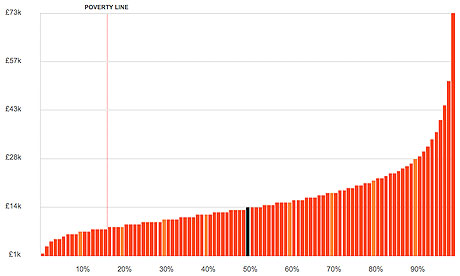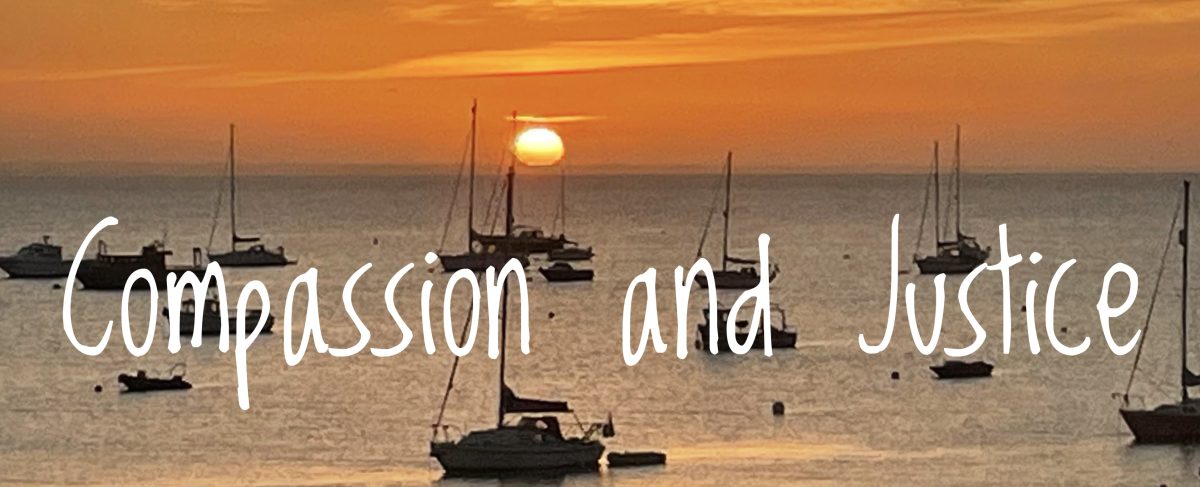
Righteousness like a never-failing stream!
Social Justice is vital if a country claims to be morally as well as economically developed. The measure of a country is how the government and the people of that country treat the disadvantaged members of society. The Bible criticises those who exploit their workers, ignore the poor or do not look after the immigrant or the homeless. Sharing our resources is fundamental to the ideal of social justice.
In this article I am writing from a United Kingdom perspective, but the principles are true for all countries whether developed or developing. People are materially poor because of one or more of the following factors:
- Physical or mental disability which effects the possibility of employment
- Marriage breakdown causing a split into two households.
- Single parents struggling to balance a job and child care.
- Insufficient jobs with a meaningful salary.
- A major employer or industry closing down causing a disruption in the local economy.
- Choosing not to work and deliberately living off benefits. (I am NOT suggesting that more than a tiny minority could be classified as “scroungers” or “benefit cheats” but obviously there are a few who fit into this category.)
- Addiction to alcohol, drugs, gambling etc,
- Debt.
- Crime.
- Prejudice based on racism or class.
- Inadequate education, or failing educational achievement.
Guardian Quote
Almost 7 million working-age adults are living in extreme financial stress, one small push from penury, despite being in employment and largely independent of state support … unlike the “squeezed middle”, these 3.6m British households have little or no savings, nor equity in their homes, and struggle at the end of each month to feed themselves and their children adequately.
(Article in The Guardian “Household incomes: how do you compare?”)
The Poverty Line

In the United Kingdom, relative poverty is defined as people and families with earnings less than the poverty line (60% of the median income). If the country prospers, and incomes increase, then so does the poverty line and just as many people are still “relatively poor”. If overall incomes fall (as they have done since 2009,) then some people will find themselves technically “out of poverty”, even though their income has not increased and they are no better off than before.
The figures below are for a single person living alone, For couples and single parents, the situation is much more complicated and depends on the number of children, other benefits etc.
- The poverty line for 2010 is £169 per week. Any person whose income is below that is living in relative poverty.
- No figures are yet available for 2012, but because incomes are still falling, I have estimated a figure of £160 a week.
- The starting points for tax and national insurance are £156 and £146 and so someone classed as relatively poor may still pay a little tax.
- For a single pensioner, the state pension, topped up by a pension credit is £143, so without any further earnings, pensioners will be classed as relatively poor.
- The job seekers allowance is just £71 a week so unless there are other benefits, they will live far below the poverty line.
- Having a job at the minimum wage, working for 35 hours a week, will earn £196 a week after income tax and national insurance: only a little above the poverty line.
HM Government article on social justice
I have just read a paper presented to Parliament by the Secretary of State for Work and Pensions, Ian Duncan Smith. Unfortunately, government policy does not measure up to the high ideals this report presents and rather than producing social justice, the reality is that the poorest section of the population is really struggling, the middle ground is being squeezed and only the richest are getting any more prosperous.
The article does, however, reveal some disturbing facts:
- There are 3.9 million workless households in the U.K. (One in 5!)
- There are 300,000 households where no-one has ever worked.
- 40 per cent of newly sentenced prisoners said they had been permanently excluded from school and 46 per cent said they left school with no qualifications.
- 28% of single parent families live in relative poverty.
- An estimated 10% of all households are struggling with debt arrears.
- While recognising that many single parents do an excellent job, the report states “Evidence suggests that children tend to enjoy better life outcomes when the same two parents are able to give them support and protection throughout their childhood”.
A new ethos?
- The Government believes that the vast majority of people cannot and will not have their lives changed through ever-increasing benefit rates.
- Promoting work for those who can do so as the most sustainable route out of poverty.
- Unconditional support to those who are severely disabled and cannot work.
- A “fair deal for the taxpayer”
The reality
- Many families are suffering a reduction, certainly not “ever-increasing” benefit rates.
- The fact is that there are insufficient meaningful jobs available for all the people on benefits,
- There are many people who are not “severely disabled” but who find it difficult to find work, suffering prejudice and who are effectively unemployable.
- It is a bit rich talking about “a fair deal for the taxpayer” when the highest earners are about to get a tax-cut and even many who are employed at the minimum wage, yet classified as relatively poor still have to pay tax on their income and spending.
The principle of reducing dependency on state benefits is fine, but the emphasis should be on creating meaningful employment opportunities rather than punishing those who, often through no fault of their own, have to rely on outside help.
What Social Justice demands
- Ensure that disadvantaged members of society, (whether temporary or permanent), have something to fall back on so that their families are not living in poverty.
- An emphasis for the government, and industry and commerce, to create jobs rather than punish those who don’t have jobs. For the government to create jobs, the cost is minimal because there is a big benefits saving, as well as savings in crime levels, savings to the National Health system etc.
- An increase in the minimum wage to motivate people to seek employment and to ensure that single parents and those with a number of children are not still living in poverty in spite of working full-time. Can we afford it? Yes, we can, if we do not intend to exploit our workers.
- Ensure that young people have sufficient opportunities and that the apprenticeship scheme is not used as an excuse for cheap labour.
- Do not label every one who receives state benefits as “scrounger” or “benefit cheats”.
- Do not make the wrong assumption that foreigners only come to claim benefits rather than to work and often do the work no-one else is prepared to do.
But let justice roll on like a river,
righteousness like a never-failing stream!
(Amos 5:24 NIV)
Related articles
- Poverty map shows how cuts in benefits will hurt children (guardian.co.uk)
- Westminster welfare cuts will push 15,000 more Scottish children below the poverty line (dailyrecord.co.uk)
- Majority of British children will soon be living in poverty, report warns (express.co.uk)

The reality is that many people feel very strongly about poverty in this country, particularly child poverty as it has such devastating long term impact on children’s lives. Childhood poverty detramentally impacts peoples mental and physical health, educational outcomes, social development, life expectancy, social mobility and life chances. You can see how much people care when comic relief raised over £75,000,000 last night.
What is needed is a radical political solution, unfortunately in Britain today politicians only care about staying in power. They focus on keeping the wealthy and powerful happy so that they can stay in government enjoying the trappings of self importance and celebrity status. There is no one to vote for who is offering change, and if there was, I think we would all be too scared to take that opportunity and make the radical change it would bring to our lives and our society. To share wealth more equally the rich and powerful need to be prepared to have MUCH less wealth and MUCH less power.
It is a problem!
LikeLike
Dear Me
Thanks for your comments. I agree entirely. I think you and I should form our own political party and make some real changes 🙂
LikeLike